THE GATHERING: EARTH EDITION
Solving South Africa’s energy and environmental crisis is ‘not a moonshot, it is within our grasp’ – De Ruyter
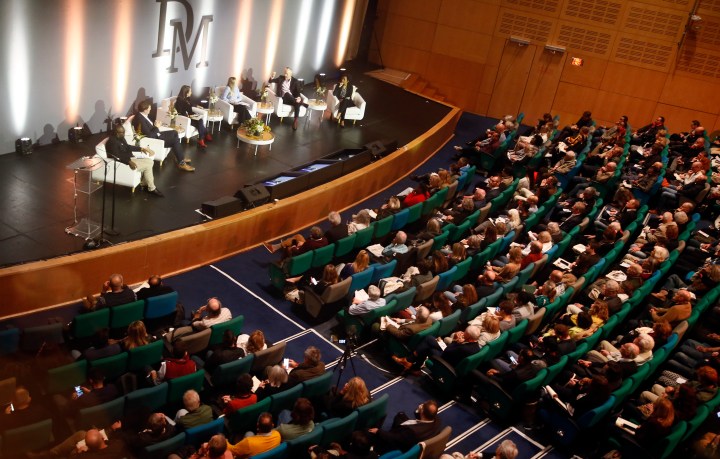
In a keynote address at Daily Maverick’s first Earth Edition of The Gathering, former Eskom CEO André de Ruyter said South Africa’s interrelated energy and environmental crisis was an opportunity, not a threat. He outlined five arguments for decarbonisation. The panellists who spoke after his address shared his argument for hope.
In a striking convergence of global and domestic challenges, South Africa finds itself caught at the confluence of the planet’s climate crisis and its own failing, heavily pollutive energy infrastructure.
As the country grapples with the impacts of its heavy reliance on coal for electricity generation and severe electricity shortages, the urgent need for sustainable energy solutions gains even greater significance, highlighting the intertwined nature of environmental and systemic deficiencies faced by the nation.
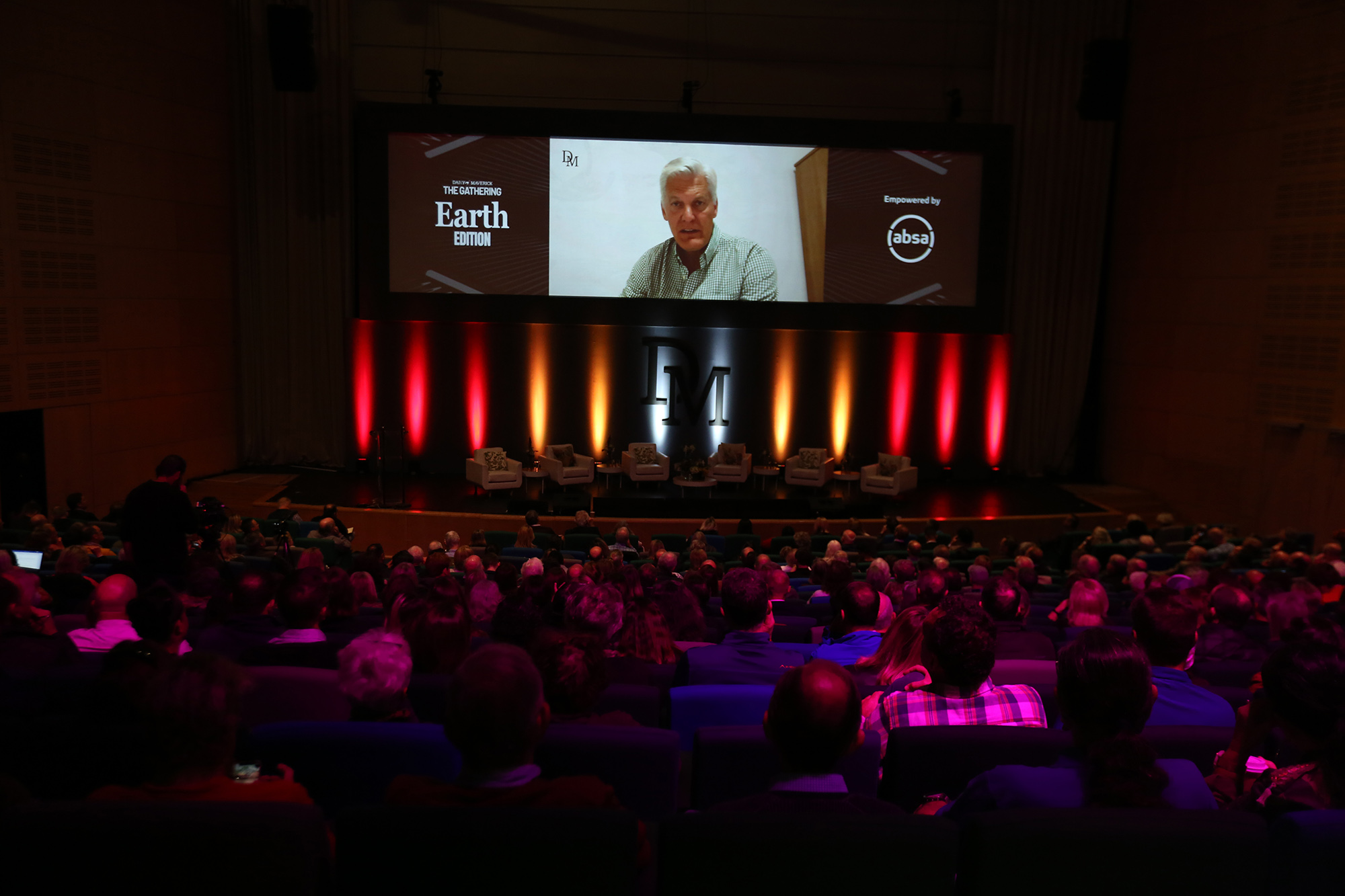
Former Eskom CEO André de Ruyter at The Gathering: Earth Edition. (Photo: Shelley Christians)
In a keynote address at Daily Maverick’s first Earth Edition of The Gathering event at the Cape Town International Convention Centre (CTICC), former Eskom CEO André de Ruyter spoke to precisely this reality.
He said that, broadly speaking, there are five arguments for decarbonisation:
- Allay: De Ruyter said we can “allay our energy crisis by rapidly deploying renewable energy at scale. We now have a proven technology, both wind and sun. That is the cheapest, more than competitive against new coal, new gas, new nuclear, but more importantly [it] can be deployed within between 18 months and two years at utility scale, thereby addressing the much-needed shortfall of round about six gigawatts in generation capacity that the country requires”;
- Economy: “We can remove the constraints that the energy prices place on our economy, we can restore investor confidence. We can catalyse an enormous amount of investment amounting to R1.2-trillion. Of course, then we need to behave reasonably, we need to choose our partners carefully. And we need to account for the fact that geopolitics are at play and we can’t just pick and choose our friends and ignore our own interests by siding with the pariahs of the world”;
- Employment: The former CEO added that “if you’re a coal miner, you have justifiable concerns that your job may be imperilled by the transition away from coal”, but added that “numerous studies have indicated that up to 300,000 net new jobs… will be created if this new energy profile decision is deployed wisely and in a structured manner rather than chaotically, which is pretty much the case at the moment”;
- Environment: “Africa is uniquely susceptible, by some accounts twice as susceptible as other countries [to] the risks of climate change. And we cannot ignore that we cannot pretend that we have the right to continue to burn coal and ignore the impact that climate change will have on our country,” said De Ruyter, adding that “burning the amount of coal that we do, about 160 million tonnes or so per annum, has a huge negative impact on the health of our people and there are reportedly more than 2,000 premature deaths annually”. Decarbonisation has other benefits on our water-scarce country, he noted, saying: “If we shut down 22-23GW of generation capacity by 2035… then we will release sufficient water back into the Vaal River system to supply 220 litres of water per day – that’s about a bathtub full of water per day for 200 million people. So that’s about three times the population of South Africa”; and
- Equity: “We will run into a brick wall of opposition” if we do not make the transition equitable, said De Ruyter. “We need to engage and engage in a way that demonstrates empathy, understanding and a willingness to listen and to co-create solutions with those people who will be affected by this transition.” During his time at Eskom he was able to oversee the development of an assembly line for the assembly of modular micro-grids and “building a training college for the retraining and repurposing, reskilling of people so that they can be gainfully employed in the new industry”. He added that “this is a huge opportunity, but it requires us to have a coherent policy environment, we need to have supportive industrial policies.”
Summarising his address, De Ruyter said: “Let’s be clear, this is not a moonshot. This is not impossible. This is not something that we cannot do as a country.
“This is eminently within our grasp, but it requires resolve, it requires an urgency and it requires leadership to grasp this opportunity. And it is an opportunity, it is not a threat. And once we do that, we will be able to move forward and to ensure that South Africa rather than once again, for policy reasons, becoming a pariah on the world stage, can lead the world and can ensure that we become and remain a competitive country from an environmental perspective, from an export perspective, but also from an energy perspective.”
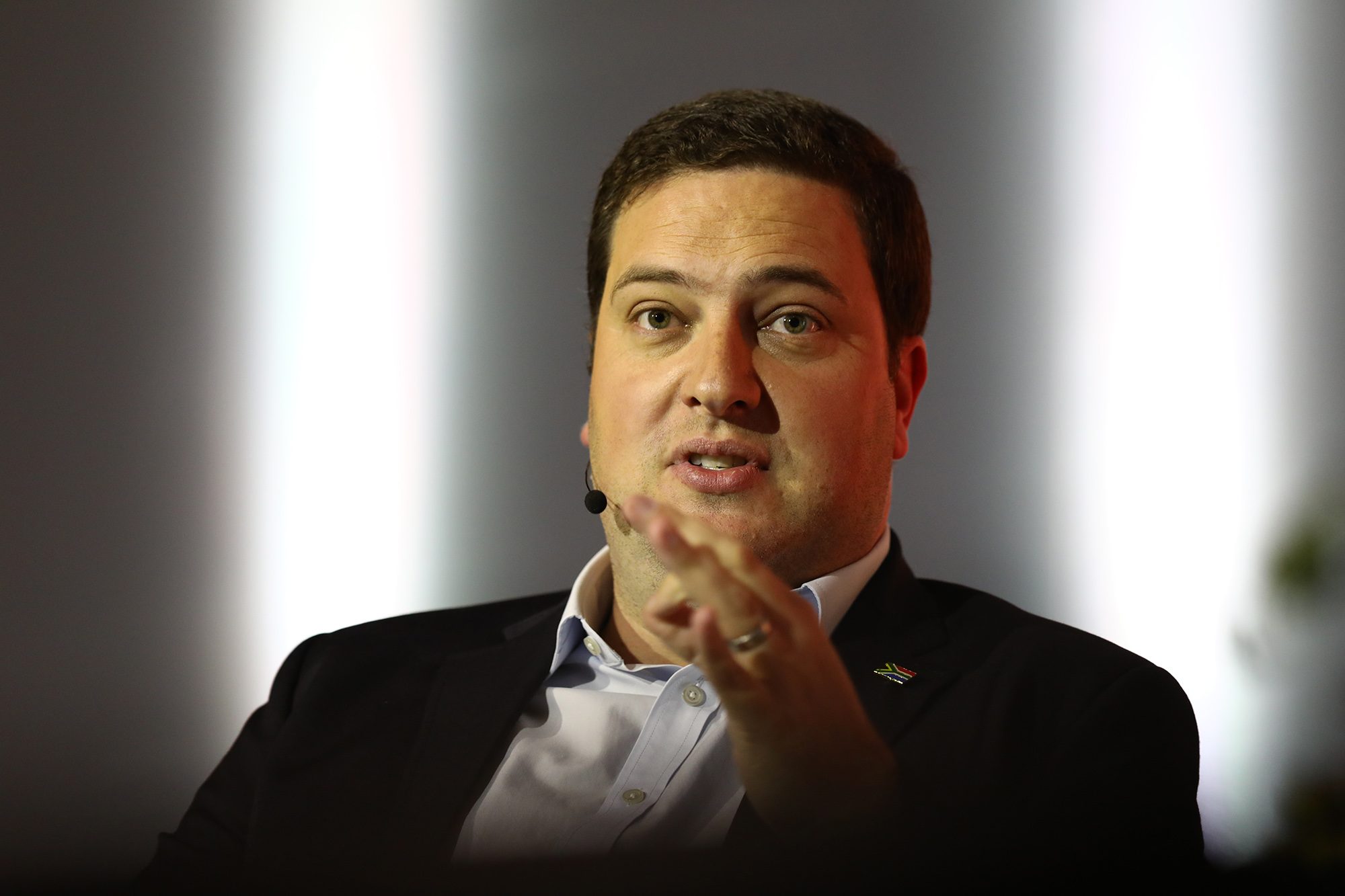
Cape Town mayor Geordin Hill-Lewis speaks at the Gathering: Earth Edition. (Photo: Shelley Christians)
In a panel discussion that followed, Daily Maverick journalists Ferial Haffajee and Victoria O’Regan were joined by:
- Dr Crispian Olver, executive director of the Presidential Climate Commission;
- Geordin Hill-Lewis, mayor of Cape Town;
- Heather Sonn, managing director at Gamiro Investments; and
- Farai Chireshe, energy analyst and project officer at the World Wildlife Fund South Africa.
“The topical subject of this panel is the energy crisis. And, you know, that is very well and true. But we also need to realise at the same time that we are also in a climate crisis. And those are both two things that we need to deal with at the same time,” said Chireshe, referring to the devastating floods in KwaZulu-Natal and the Day Zero drought in Cape Town a few years ago.
“And the more that we don’t take action on climate, these actions are just going to get worse. So… try to imagine what the situation is going to be like in the future. So, from how I see that energy future, we are looking at an energy future that is climate-resilient.
“I believe all this is possible and I believe that we do need the right planning in place, proper planning from an energy perspective, to make sure that we are aligned with this goal of net zero.”
Electric ‘dream’
Hill-Lewis outlined his “dream” of a post-Eskom future for Cape Town, “but it’s [a dream] not in the long-term future. We are busy building it right now because we have zero confidence that the problems that we face as a country, as a city – the power problems in particular – are going to be fixed by Eskom.
“If they are going to be fixed, they’re going to be fixed by us,” he proclaimed.
I think this is an awakening time in our democracy. And I think energy is a proxy for that.
“And so, we are rapidly trying to buy renewable power to add to our grid as quickly as possible from every source that we can possibly get it, and that is primarily focused at [remedying] our supply crisis. It has very important ancillary environmental benefits as well, which we are not blind to.”
Asked about timelines, the mayor said that in the next 36 months they wanted to get 700MW connected directly to the city’s grid.
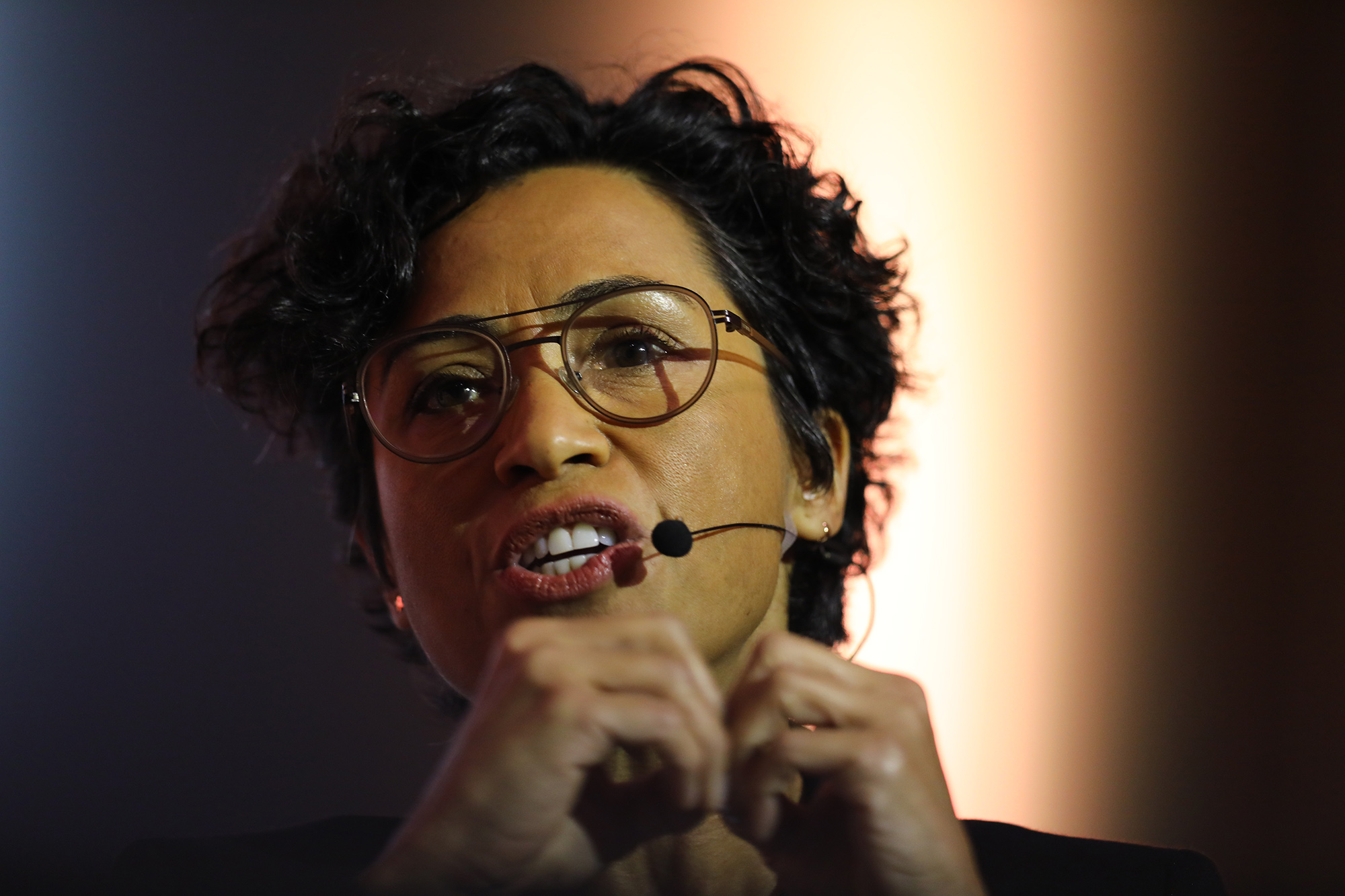
Managing director of Gamiro Investment Holdings Heather Sonn speaks at The Gathering: Earth Edition. (Photo: Shelley Christians)
Democratisation of power
Asked about what makes her excited about the future, Sonn said “the democratisation of power and how we find our individual power within our democracy to make a difference”.
“We’ve been through our political processes, and now we are in the process of finding our individual agency,” she explained.
“I think currently people talk about a failed state and so many definitions have been bandied about, but I think the important thing is to say, as in nature… there are periods of chaos. And in that period of chaos, there is an opportunity for reordering and I think what we have now is an opportunity to figure out what each and every one of our roles is in reordering.
“What I see in the future and what I see happening is that individual energy generation in households is occurring. So, I think this is an awakening time in our democracy. And I think energy is a proxy for that.”
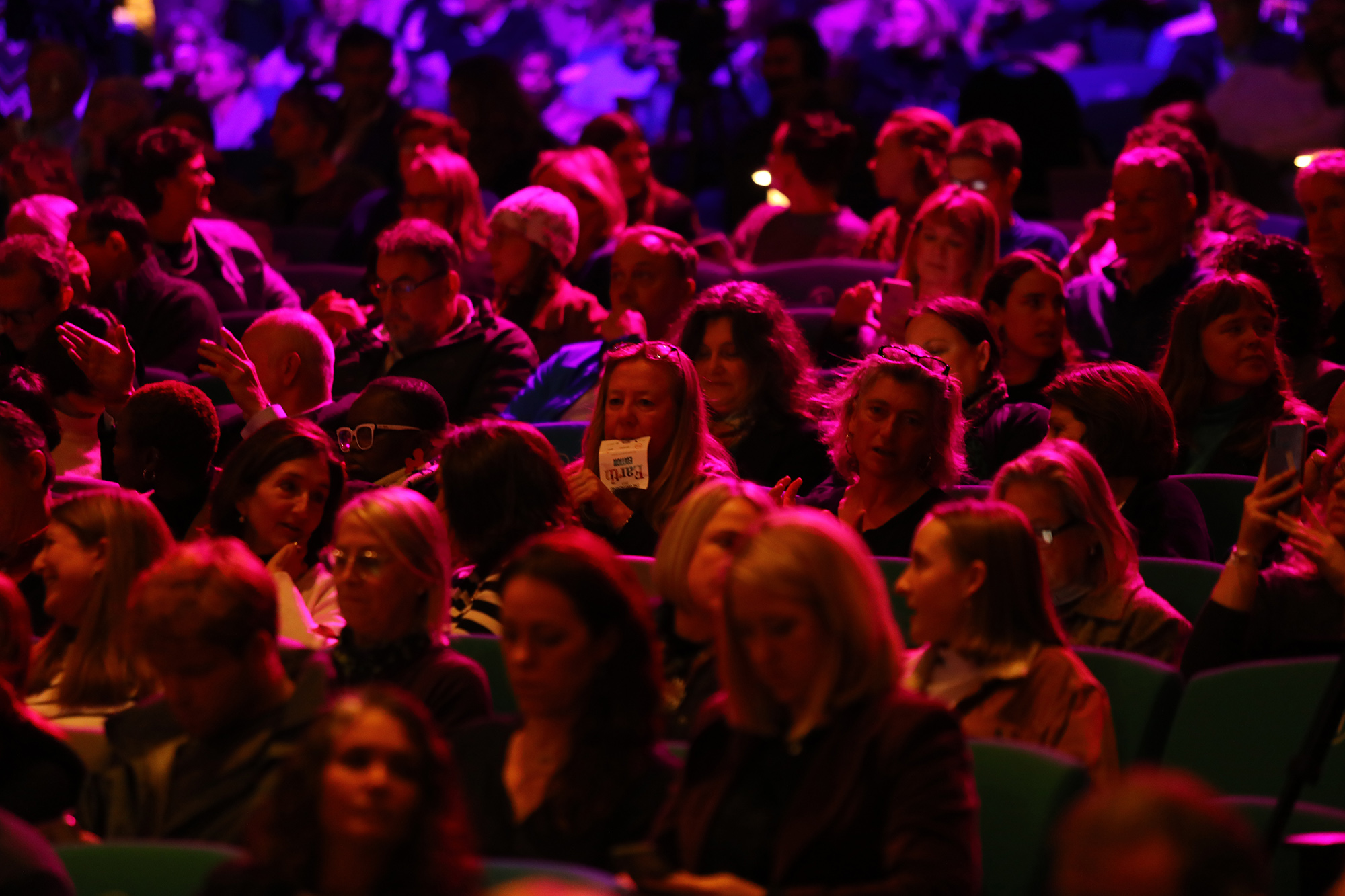
A general view of the audience during the Gathering Earth Edition during the South Africa’s Burning Energy Problem panel. 26 May 2023. (Photo: Shelley Christians)
Think global
Olver was asked to explain his positive disposition as it relates to South Africa’s energy future and nascent transition. He explained that fundamental changes have occurred that will enable the country’s energy transition, not least the removal of the cap on embedded generation enabling the private sector and individuals to generate a theoretically unlimited amount of electricity. Globally, he said, the transition is accelerating and moving along steadily and South Africa would have no choice but to be a part of it.
“Make no mistake, this is a global transition of the order of the Industrial Revolution. Thinking that we will somehow be able to keep our finger in the dyke and stop the transition, you’re not understanding the nature of what’s going on,” he said.
“I mean, the old idea that someone’s sitting in charge of [the Department of] Mineral Resources and Energy could dictate the pace at which this transition happens – it’s the emperor with no clothes.” DM





















 Become an Insider
Become an Insider
There seem to be so many really good intelligent, honest South Africans, any of whom I would imagine could do a better job than our current government. Why is it so difficult??
It’s not difficult. It’s our voting system that needs to change. Our current system enables a 1000 to 2000 people to determine who runs the lives of 60+ million people in the country. How democratic is that? Move away from voting for parties of whom the “winners” end up with the power to do what they want. The ruling party then sits with an unfair advantage in parly.
If only these speakers were leaders of the country instead of the blinkered incompetent ministers and corrupt ANC members
I thoroughly enjoyed listening to people saying things that were sensible and logical, without hidden agendas. The ANC could learn so much from all the people involved. Well done, DM!
“I mean, the old idea that someone’s sitting in charge of [the Department of] Mineral Resources and Energy could dictate the pace at which this transition happens – it’s the emperor with no clothes.”
And there my friends is the problem. It’s an ideological circus in charge of the country.